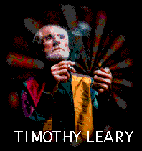2.7.4. The Esoteric Essence: a Strive for Immortality
You can duplicate any human emotion or recreate any human experience with technology - Michael Deering
You only live twice - James Bond 007
The research on cyberspace is a quest for God. To be God. - Paul Virilio
Cyberspace and VR radically questions the status of the body in our culture. The body becomes viewed as something "impure, treacherous, and, most annoying mortal."(Slouka 1996: 25) VR promises to resolve these problems: "In this New Age, boundaries between self and other, male and female, nature and machine, even life and death, would be obsolete. The world reality would lose all meaning, or would metastasize beyond recognition." (Slouka 1996:17) Virtual reality is all about the transcendence of the body.
When the reality of space-time is nothing else than an illusion, a selfconstructed reality, then even the biggest bug of humans, mortality, can be fixed. Just as time-travelling seems to be no problem for virtual identities, so it is with immortality. The longdreamt dream of immortality seems to come into the reach of mankind.
 As Timothy Leary and Eric Gullichsen argue that there are many
ways, how we can reach immortality, and they all are similar to
creating electronic or digital identities. The basic rule to become
immortal is:
As Timothy Leary and Eric Gullichsen argue that there are many
ways, how we can reach immortality, and they all are similar to
creating electronic or digital identities. The basic rule to become
immortal is:
"Preserve your body-
preserve your brain-
preserve your DNA.
To immortalize: digitize!"(Leary 1994: 202)
According to them different types of immortality-software is already
available: 1. archival-informational method that works in leaving
a trail of archives, biographies, tapes, films, computer files,
and publicized noble deeds.
2. Personality data-base transmission, programs which try to record
and digitize thoughts to program an artifical intelligence e.g.
Headcoach, by Futique, Inc..
Future speculations even suggest nanotech information storage,
a direct brain computer transfer.The data gathered by these storage-programs
can then be made immortal in form of a viral existence in the
cyberspace-matrix, "capable of traversing computer networks and
of self-replication as a guard against malicious erasure by others
or other programs."(ibid: 201)
This data would then lead to a predicted
"KON-TIKI OF THE FLESH
In the near future, what is now taken for granted as the perishable
human creature will be a mere historical curiosity, one point
amidst unimaginable, multidimensional diversity of form. Individuals,
or groups of adventurers, will be free to choose to reassume flesh-and-blood
form, constructed for the occasion by the appropriate science."(ibid:
202)
Just like cryonics promises to store the dead body to be healed
in the future, immortality software promises to store the personality
information, to reestablish a flesh and blood form with a new
flesh and blood form with the old personality.
However the flesh and blood form of life seems to become less desirable anyway. The virtual life on- and offline becomes for many people the more important part of their lives. And in the digital realms death as such does not exist. Virtual identities have as many lives as they wish. In computergames you win and loose lives as you win and loose money in a casino.The same is true for MUDs. If you get killed, just log on with a new or your old persona or avatar. Interesting is that the word 'avatar' is taken from Hinduism, where avatar means something like the flesh and blood incarnation of a God. Just like Hinduism, virtual reality suggests a cycle of reincarnations, rather than a unique, linear life from birth to death. And there are no virtual graveyards for the dead avatars. They just disappear in a colourful flashing delete.
 The actual death of ones body looses this way its uniqueness and
sadness, as it is just one more death. Actual death becomes an
online-performance (like Timothy Leary's death) with the effect
that the person lives on in form of their memes, a viral existence
in the mediasphere. If you cannot perform your death yourself,
as it comes to suddenly like Princess Diana's, journalists will
transmit the pictures of dying via satellite in real time to the
whole world, with the effect that Diana lives in the media-sphere
more than ever before. She is immortal in form of her signs and
messages, as an icon with a memetical existence.
The actual death of ones body looses this way its uniqueness and
sadness, as it is just one more death. Actual death becomes an
online-performance (like Timothy Leary's death) with the effect
that the person lives on in form of their memes, a viral existence
in the mediasphere. If you cannot perform your death yourself,
as it comes to suddenly like Princess Diana's, journalists will
transmit the pictures of dying via satellite in real time to the
whole world, with the effect that Diana lives in the media-sphere
more than ever before. She is immortal in form of her signs and
messages, as an icon with a memetical existence.
This way immortality through media means that you cannot be mortal anymore. You cannot die and disappear anymore without leaving a massive amount of trails and records, ready for reproduction. Diana is dead more real and more alive than she was alive, she is hyperreal and hyperalive.The massive amount of records in any kind of form will soon be used to animate an avatar, equipped with artificial intelligence and a digitized voice and you will be able to meet her in a MUD or an arcade game. She will live on and even evolve and develop as her AI has the ability to learn. May this animation-program is used for the control of a robot, to make her kon-tiki of the flesh even more perfect. Diana will also live on in form of a 35mm celluloid, as the screenplay is already in the making.This way Diana will reincarnate in form of many avatars, just like the Hinduist Gods choose a body to come to earth.
Maybe Diana died for the few, who knew her personally, but for the millions who knew her from the media she is as hyperalive as ever before. So it is not a question of immortality, it is more a question of the impossibility of dying.
Cybertechnologies promises its intentional or accidential user
a God -like status. And immortality is by far not the only feature
you can buy in the next software-shop. You can buy omniscience,
because you can access any information available on this world
in the internet, omnipresence, because you can be everywhere and
in every time through telepresence, omnipotence, because you are
able to control the whole virtual reality surrounding you, like
you can create a world in Simcity®.  Cybertechnologies promise its user a Godlike status. "The technologies
of virtual reality are attempting to make us see from beneath,
from inside, from behind ... As if we were God [..] cyberspace
is acting like God and deals with the idea of God who is, sees
and hears everything." (WWW: Cyberwar, God and Television: 4)
And the development goes even further, when Paul Virilio's third
evolutionary step, transplantation, becomes realized.
Cybertechnologies promise its user a Godlike status. "The technologies
of virtual reality are attempting to make us see from beneath,
from inside, from behind ... As if we were God [..] cyberspace
is acting like God and deals with the idea of God who is, sees
and hears everything." (WWW: Cyberwar, God and Television: 4)
And the development goes even further, when Paul Virilio's third
evolutionary step, transplantation, becomes realized.
"Real time 'live' technologies, cyberreality, will permit the incorporation of the world within oneself. One will have become the world. [..] Once again, this is a divine vision; and this is what the military are looking for."(Cyberwar, God and Television: 8)
But what is it to be like God when in principle everybody with enough money can buy it in the next shop and when that means that we have to become like a machine. Are we the Gods or is it not just more the machine itself which has a God-like status: a deus ex machina?
![]()